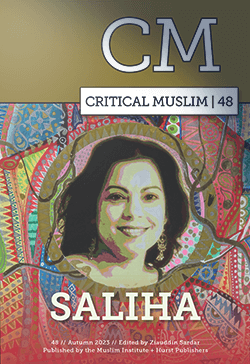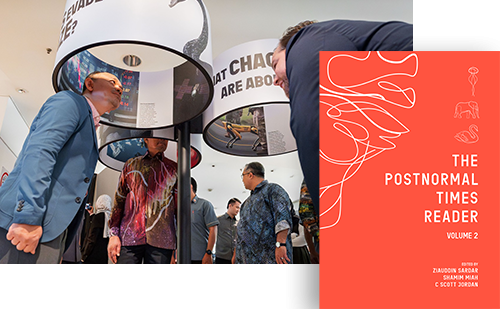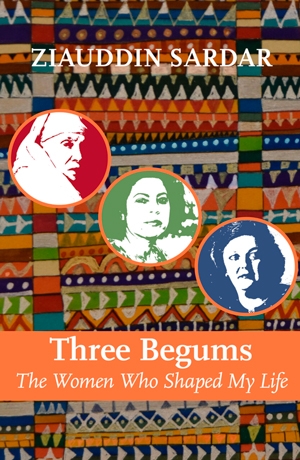Ziauddin Sardar, scholar, writer, broadcaster, futurist, cultural critic and public intellectual, has been described as ‘Britain’s own Muslim polymath’- The Independent
Ziauddin Sardar opens a door to places many of us would not otherwise see – The Guardian
In Islamic context, but perhaps in any context, his achievement is startling in its range, boldness, scepticism and, above all, sheer quantity – New Statesman
We must search for the answers to the questions he asks if we are to challenge and change the status quo – Socialist Future
1951
Born in Dipalpur, Pakistan.

1961
Moves with parents to Hackney, East London.

1969
Publishes Zenith, ‘a monthly magazine by and for the Muslim youth in Britain’.

1971
Elected as General Secretary of FOSIS – the Federation of Students Islamic Societies.
1971–74
Reads physics and information science at the City University, London.

1974
Works to establish ‘the Muslim Institute for Research and Planning’ in London. Joins the Hajj Research Centre, King Abdul Aziz University, Jeddah; and performs the Hajj.
1976
Performs the Hajj, walking from Jeddah to Mecca with a donkey.

1977
Publishes ‘Science Policy and Developing Countries’ in the seminal work Science, Technology and Society: A Cross-Disciplinary Perspective, edited by I Speigel-Rosing and D de Solla Prince (Sage, London and Beverley Hills); followed by first book, Science, Technology and Development in the Muslim World.

1978
Becomes the Muslim World correspondent for Nature.

1980
Moves to New Scientist as Middle East Science Consultant.

1982
Joins London Weekend Television to work as Reporter/Presenter for Channel 4’s ‘Eastern Eye’.

1983
Establishes, and becomes the coordinator, of a group of Muslim intellectuals who describe themselves as ‘the Ijmalis’ (those who value Beauty).

1984
Launches and edits monthly Inquiry international, ‘magazine of events and ideas’.

1985
Presents ‘Encounters with Islam’, a series of four half-hour shows for BBC1; and establishes the Centre for Policy and Future Studies, East-West University, Chicago.

1987
Becomes Special Advisor to Datu Sri Anwar Ibrahim, Minister of Education and later Deputy Prime Minister of Malaysia.

1991
Starts to write regularly for the Independent and occasionally for The Times.
1993
Joins Faculty of Technology, Middlesex University, as Visiting Professor of Science Policy; publishes the ground-breaking paper, ‘Colonising the Future: The “Other” Dimension of Future Studies'.
1994
Publishes Muhammad for Beginners, first of seven Beginners books, later renames as Introducing.

1996
Publishes Cyberfutures: Politics and Economy on the Information Superhighway, with Jerry Ravetz, first book of a long collaboration; gives the First Sadad Hassan Manto Lecture at the Nehru Memorial Museum and Library, New Delhi: ‘Sex, Lies and all the I’s in India’

1999
Becomes Editor of Futures, the monthly journal of policy, planning and futures studies.

2000
Joins New Statesman as a Special Correspondent and Columnist.

2001
Becomes Co-Editor of Third Text, the bi-monthly critical journal of visual art and culture.

2005
Writes and Presents, ‘Battle for Islam’, a 90-minute documentary for BBC2.
Become a regular member of the ‘Friday Panel’ for the ‘World News Tonight’, Sky News.

2006
Appointed as a Commissioner for the Equality and Human Rights Commission, UK.
2007
Commissioned to Blog the Qur’an for the Guardian; writes and present ‘Between the Mullahs and the Military’ for Channel 4’s Dispatches.
2009
Appointed Member, Interim National Security Forum, Cabinet Office. Relaunches the Muslim Institute, London.

2010
Publishes the seminal paper, ‘Welcome to Postnormal Times’; appointed Professor of Law and Society, Middlesex University
2012
Publishes and edited the quarterly Critical Muslim; collaborates with the British Museum on the Exhibition, ‘Hajj: Journey to the Heart of Islam’; and establishes the Centre for Postnormal Policy and Futures Studies.

2019
Continues to organise and lead a series of workshops on Islam and Futures Literacy, which began in 2015, in Kuala Lumpur, Istanbul and Sarajevo, leading to the publication of Muslim Futures in Postnormal Times: Foresights for Trends, Emerging Issues and Scenarios (with Jordi Serra and Scott Jordan)

2020-21
Spends the Covid-19 pandemic amongst the plants in his garden, mourning the deaths, in quick succession, of his beloved mother, and life-long intellectual companion, Merryl Wyn Davies; and reflecting on the changing nature of Knowledge and ignorance

2022
Edits and publishes, Emerging Epistemologies: The Changing Fabric of Knowledge in Postnormal Times

2023
Devastated by the sudden death of his beloved wife, finds himself in a ‘dark and lonely place’. Writes a tribute to her, described as ‘riveting and deeply moving’, for an issue of Critical Muslim devoted to her memory – CM48: Saliha.

- © 2018 Ziauddin Sardar
- Privacy Policy
- Terms of Use















